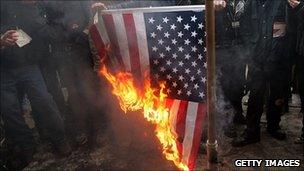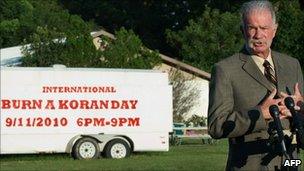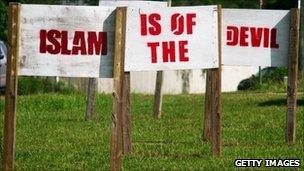Why US government could not have stopped the Koran bonfire
- Published

Flag burning offends many Americans, but it is protected under the constitution
The cancellation of a small Florida church's plans to burn Korans was not a result of government intervention. Nor was it the the product of a legal challenge.
Pastor Terry Jones claimed the issue was resolved through private negotiation with a New York imam, amid talk of repercussions for US troops abroad.
In fact, there was little the federal government could do but but watch - the US constitution rendered it almost powerless to stop the bonfire.
The United States stands apart from many other Western democracies in priding itself on a near absolute commitment to allowing freedom of speech.
It is enshrined in the First Amendment to the US constitution, alongside the right to free exercise of religion.
"Congress shall make no law… abridging the freedom of speech, or of the press; or the right of the people peaceably to assemble," the relevant passage says.
Deeply ingrained in the American psyche, these rights are seen almost as a matter of national identity.
"The fundamental principle is that the government cannot restrict speech based on its content, even if an audience finds it offensive," says Prof Tim Zick, a First Amendment specialist from the William and Mary Law School.
"A speaker's autonomy to express himself - even in this deeply offensive manner - is, if not sacrosanct, then very highly regarded."
As a nation, he says, America has made a very different calculation about the protection of the speaker versus the dignity of the audience than many countries in Europe. America prioritises the autonomy of the speaker.
Denying the Holocaust, for example, is illegal in 16 European countries. Germany has banned the production and dissemination of pro-Nazi material.
But in the US, the courts have protected the rights of Nazis to express their views.
In one well-known case, the Supreme Court invoked the First Amendment to uphold the right of a neo-Nazi group to march through the predominantly Jewish town of Skokie, Illinois, and display swastikas.
Symbolic messages
The courts have decided that speech encompasses a wide array of non-verbal actions intended to communicate a message. That means symbolic acts such as the burning of a cross or Bible are protected under the free speech clause.
"Generally the first amendment protects offensive, repugnant and even hateful speech," says David Hudson, a scholar at the First Amendment Center in Washington DC.

Many outside America wonder why the US government could not have stopped Pastor Jones's bonfire
That is why, in America, demonstrators can legally burn the American flag or the Ku Klux Klan can burn crosses, even though such activities can both outrage and offend.
"Even with respect to one of our most sacred symbols - the American flag - burning is lawful," says Mr Zick.
Such protections exist only up to a point. When speech crosses the line into threats which may directly incite violence or lawlessness, the First Amendment no longer applies.
Mr Hudson stresses that for legal purposes a threat must be imminent. "You have to show the immediacy of harm," he says.
For example, a Ku Klux Klansman may legally burn a cross on his own property as a political statement, regardless of how offensive his intentions may be to many.
But if he were to burn that cross or hang a noose at the house of a black American, the courts might consider his action an incitation of violence against that individual.
For that he could be arrested and tried.
'True threats'
The case of Ku Klux Klan cross-burning however is a specific exception. It has long historical associations with racism and violence against minorities in America.

Signs at Pastor Jones's church may be offensive, but they are not illegal
Burning sacred texts has not traditionally been linked with violence in the US.
"It would be difficult I think to categorise the burning of a book as a true threat," says Mr Hudson.
Nor could burning a Koran be considered a hate crime.
"The offence is to the object, which is obviously sacred, but it would not fall under hate crimes because it's not a crime affecting a person," says Mr Zick.
Pastor Jones has said that his bonfire was intended to send a message to Americans that they need to "stand up" to radical Islamists.
He would have burned books on private land, owned by his church. If he were to have moved his protest to outside a mosque, it is possible he could have been charged with disorderly conduct or breach of the peace.
But even then, Mr Zick notes, legal precedent means police are obliged to protect a person's right to speak.
If authorities had wished to clamp down on Pastor Jones, the only legal avenues would have been quite banal. He needed a permit to hold an outdoor fire in Florida, and even before the event was called off, he did not have one.
- Published9 September 2010
- Published9 September 2010
- Published9 September 2010